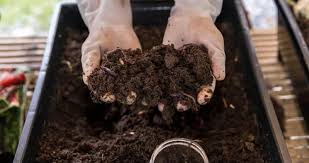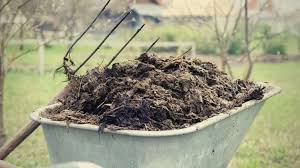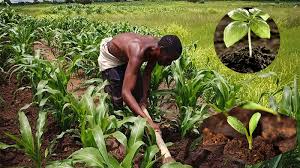![]()
If you’ve landed on this article page, you’re probably searching for a
good business idea—an idea that’s light on the pocket but heavy on
returns, promising both a fulfilling journey and potential profit.
|
Starting an Organic Manure Production
How to start Organic Manure Production in Nigeria
In Nigeria, there has been a growing interest in organic farming
practices due to health and environmental concerns. Consumers
are becoming more conscious of the food they eat and are seeking
organic produce for their nutritional benefits. Farmers are also
realizing the long-term benefits of organic farming, such as
increased soil fertility and pest control.
Environmental Benefits of Organic Farming: Organic farming
significantly reduces pollution. It eliminates the use of
synthetic pesticides and fertilizers, which often contaminate
water sources. Natural pest control methods and organic
fertilizers prevent harmful chemicals from entering the
ecosystem. This approach helps maintain cleaner rivers and
lakes, preserving aquatic life.
Improved soil health is another key benefit of organic farming.
Organic practices enhance soil fertility by using compost,
manure, and crop rotations. These methods enrich the soil with
essential nutrients, boosting its productivity.
They also improve soil structure, promoting better water
retention and reducing erosion. Biodiversity thrives on organic
farms. Organic farming practices create a healthier environment
for beneficial insects, birds, and other wildlife. By avoiding
harmful chemicals, organic farms support a diverse ecosystem.
This biodiversity helps control pests naturally and pollinate
crops more effectively.
Organic produce reduces exposure to harmful chemicals. Synthetic
pesticides used in conventional farming can have adverse health
effects. They have been linked to various health problems,
including cancer and hormonal imbalances. By choosing organic,
consumers minimize their risk of exposure to these harmful
substances.
Organic food often tastes better. The absence of chemical
fertilizers and pesticides allows natural flavors to develop
fully. Consumers frequently report that organic fruits and
vegetables have a richer, more authentic taste.
Select Suitable Organic Manure Production Methods
Assess low-cost production methods suited for small part-time
makers:
Composting – Decomposing organic waste using microorganisms into
nutrient-rich manure. Simplest and cheapest.
Vermicomposting – Composting using earthworms to create organic
casting fertilizer. Fast processing.
Bokashi – Fermenting organic matter using beneficial microbes
into ready-to-use manure. Low labour and space needs.
Aquaponics – Combining hydroponics and aquaculture to derive
nutrient-rich manure from fish waste.
Anaerobic digestion – Breaking down organic material in
oxygen-free reactors to produce methane and bio-slurry.
Start small-scale based on your capital, raw material access,
land availability, and distribution capabilities.
Source Suitable Raw Materials
Tap into abundant low-cost organic waste streams locally
available:
Crop residues – straw, husks, bagasse, coir.
Livestock and poultry manure/litter.
Food/agro-processing wastes like pomace, and brewer’s spent
grain.
Market waste like unsold produce, and vegetable peels.
Forestry wastes like sawdust, leaves and wood chips.
Aquaculture sludge from ponds and tanks.
Sewage sludge and city compost.
Scout Locations with Access to Raw Materials
Ideal locations for organic manure production have:
Abundant organic waste sources like farms, markets,
slaughterhouses etc. nearby.
Suitable vacant land available at affordable rates.
Supportive zoning regulations allowing solid waste processing
and composting.
Access to transportation infrastructure and utility connections.
No issues like close proximity to residential areas.
Run location analyses balancing feedstock access, costs,
regulatory constraints, infrastructure and market access.
Design an Efficient Small-Scale Production Layout
Optimize material flows and process steps:
Dedicated waste inspection and sorting area.
Efficient raw material handling and pre-processing spaces.
Adequate composting bins, tanks or beds based on volumes.
Curing and storage space for finished compost.
Water, ventilation and drainage provisions.
Waste discharge and wastewater management.
Safety measures like firefighting equipment.
Scope for expansion.
A compact, well-planned layout improves workload management,
material movements and safety for a small startup operation.
Invest in Essential Equipment
Prioritize equipment delivering maximum impact:
Shredders for raw material size reduction
Sieves for sorting pre-processed material
pH meters and other testing equipment
Compost turners for aeration
Tanks/Bins for composting and storage
Bagging equipment for packaging finished product
Weighing scales for raw material blending and inventory
PPE and safety gear for workers
Opt for locally-fabricated equipment and tools suited for small
batches to minimize capital outlays. Manual options allow labour
substitution for machinery.
Master Organic Manure Production Basics
Learn key parameters like carbon-nitrogen ratios, moisture
content, aeration etc.
Use quality feedstocks, efficient microorganisms and best
practices customized to the production process deployed.
Blend materials effectively into homogenous mixes for uniform
composting.
Monitor temperatures and other parameters regularly to control
the composting process.
Time curing and maturation correctly for stable, ready-to-use
organic manure output.
A sharp technical grasp of organic fertilizer production
methods, inputs and process control is essential for quality and
efficiency.
Implement a Quality Management Framework
Inspect incoming raw materials carefully to remove contaminants
and undesirable wastes.
Follow standardized operating procedures for each process step.
Monitor process parameters like moisture levels regularly.
Test samples during production and curing to ensure stability
and quality criteria are met.
Check finished compost thoroughly for uniformity, appearance,
absence of contaminants etc.
Obtain independent lab testing and certifications periodically.
Robust quality control is crucial for customer satisfaction and
securing repeat business.
Packaged compost tea and compost extracts.
Live earthworms and worm castings for vermicomposting.
Organic waste collection services for hotels, restaurants,
hostels etc. with manure supply agreements.
Composting awareness and training programs for schools and
communities.
Organic farming advisory services and soil testing for farmers.
Waste management consulting services for businesses and
municipalities.
Multi-revenue stream models create diversified income sources
beyond just manure sales.
Market Your Products Effectively
Boost sales by:
Creating a brand identity and packaging design that communicates
your quality and value proposition.
Producing content (articles, videos, podcasts) demonstrating the
benefits of your products and organic farming.
Distributing free samples to influencers like lead farmers and
agricultural officers.
Presenting at organic agriculture seminars and trade fairs.
Running social media and online marketing campaigns focused on
your target customer segments.
Sponsoring local organic farming radio shows for brand
visibility.
Utilizing relationships with cooperatives and associations for
outreach.
Blend offline and digital marketing to raise awareness and
acquire customers cost-efficiently.
The government is supporting this shift towards organic
agriculture by providing training and incentives for farmers.
Organic farming practices in Nigeria include crop rotation,
composting, and the use of organic fertilizers and
biopesticides. These practices help reduce the reliance on
chemical inputs, resulting in healthier food products and a more
sustainable ecosystem.
Overall, organic farming practices in Nigeria are gaining
momentum as more people recognize the importance of sustainable
agriculture for the future of food production and environmental
conservation.
Organic manure offers immense potential as a lucrative side
business for aspiring agripreneurs in Nigeria. With rising
demand for organic fertilizers, low startup costs, and abundant
raw material access, small-scale organic manure production can
make for a profitable hustle. With strategic planning and
efficient operations, organic fertilizer manufacturing can be
established as a part-time venture requiring minimal capital
outlay.
Get our Practical Guide on Organic Farming in Nigeria and to
explore available resources and training programs. These
resources provide valuable information on techniques, benefits,
and support networks for organic farmers.
|







